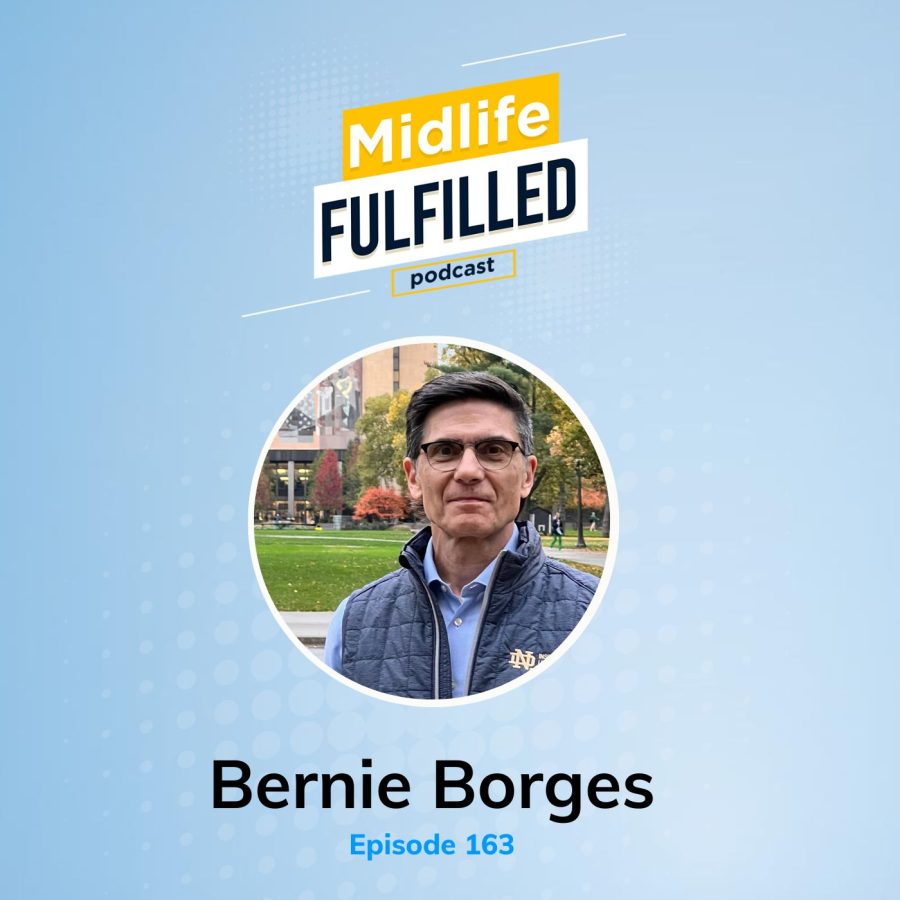Bernie Borges [00:00:00]:
Hello, my midlife friend. This is Bernie Borges, your host to the Midlife Fulfill podcast, and this is episode 163, a takeaway episode from episode 162 where I had a conversation with Shep Hyken. You know the drill. On takeaway episodes, I summarize key discussion points from the previous episode, and then I hone in on one key takeaway that I wanna emphasize to you. And then I issue you a challenge to consider on that topic. 1st, let me begin by reintroducing you to Shep Hyken. Shep is a well known expert in the customer service field. He consults for many companies, and he speaks on stages about customer service best practices.
Bernie Borges [00:00:47]:
Now, I could tell you how many books he’s written, how he’s in the health of fame at the National Speakers Association, which is quite a feat, and many, many more impressive credentials about Shep. But, what I want you to know about Shep Hyken is that he is the real deal. Shep is just a good human being. I met Shep about 10 years ago when he and I were both part of an invitation only community that was assembled by IBM during the early days of IBM’s artificial intelligence product endeavors. In those days, IBM held private events educating us, a group of about 60 people from around the world, about their new AI products and services. Now there was a lot to like about these events. They were fun. They were very informative.
Bernie Borges [00:01:41]:
But for me, one of the major highlights of attending these events was meeting and getting to know and hanging out with Shep Hyken. Now, when I invited Shep on the Midlife Fulfilled podcast, I asked him to explain how he has managed to be successful in business, in family, and friendships, and make it look so easy. So before I proceed, I wanna summarize the 3 key discussion points from our conversation on episode 162 that leads to my main takeaway. Number 1, an attitude of gratitude. In fact, I titled episode 1 62, embracing an attitude of gratitude to achieve fulfillment in midlife. Shep’s practice of writing down something positive from both his professional and his he’s been able to focus on something positive, making him even more appreciative and, as he says, resilient. Number 2. Pursuing amazement.
Bernie Borges [00:02:51]:
Shep’s definition of greatness is being just a little better than average consistently and predictably. By striving to exceed expectations in small ways every single day, he maintains a level of excellence or amazement in both his personal and professional endeavors. In fact, he doesn’t call it greatness. He calls it amazement. His email signature closes with always be amazing. And number 3, embracing retirement. Shep’s perspective on retirement is doing what you love. It’s about continuing to engage in activities and pursuits that just bring you joy and satisfaction.
Bernie Borges [00:03:36]:
Whether it’s professional work or hobbies like playing hockey like Shep does, or playing music like Shep does, or simply spending time with family. Now, according to Shep’s definition of retirement, he says that he’s been retired since his early twenties. He’s a lucky guy in that regard. So where I wanna land for my takeaway, for my conversation with Shep, is about the attitude of gratitude. And, as I often do on these takeaway episodes, I’m gonna get a little personal, and I wanna tell you that I have a confession to make. I struggle with an attitude of gratitude. Now, let me explain. 1st, I’ll take you back where Ship explained that he began a habit of writing down something that he grateful for every day, 7 days a week.
Bernie Borges [00:04:27]:
He wrote one gratitude moment from his business and one from his personal life. He gave the example that even if he had a bad day at work, he would recall something positive that happened that day, such as a conversation with someone, or he would find something positive in his personal life and just write it down. He didn’t over complicate it. He simply found something positive in each area of his life every day, and he wrote it in his gratitude journal. Now, look. I believe in the power of writing things down. Many of us have improved our ability to recall something but most of us take notes in meetings. See, the exercise of writing has an impact on our brain’s ability to comprehend things better.
Bernie Borges [00:05:22]:
So it’s no surprise that Shep got into the habit of writing daily positive experiences, and this alone takes tremendous discipline. And I really admire Shep for doing it. Clearly, it’s had a very positive impact on his life in many, many ways, and I think we can all learn from this. Now, I think gratitude is a wonderful trait. I really do. When I say that I struggle with the attitude of gratitude, I don’t mean that I struggle with being grateful. That’s not what I mean. In fact, I express my gratitude in my daily prayers.
Bernie Borges [00:05:56]:
And if you either meditate or pray, maybe you do something similar. But here’s why I struggle with the attitude of gratitude. When I was thinking about this topic, I concluded that I combine gratitude with accountability. I combine gratitude with accountability. In other words, I lump them together. Let me explain. I have written down 10 affirmations that I recite out loud to myself every morning, and they serve to remind me of what I strive to accomplish in my life. Now they’re very personal.
Bernie Borges [00:06:35]:
I’m gonna share one of them with you. The one I’m gonna share is this one. I am accountable for every outcome in my life, whether it’s a success or a failure. Now, this is the hardest of the 10 affirmations that I recite out loud every day. And since I’m getting personal with you again here, I’ll be honest. Sometimes, I say it kinda casually, as if to get past it and on to the next affirmation. But, look, I can’t fool myself. I know it when I do this, and I never lose sight of the fact that I am accountable for any success or failure.
Bernie Borges [00:07:17]:
Now, the reason that this affirmation is so hard is because I have had more failures than successes. Now I’m not gonna air my dirty laundry on the pod. Suffice to say that I have failed more than I’ve succeeded. And you know what? I wonder if I’m alone. Because I look around and I see people who appear to have had way more successes than failures, but I wonder if when they’re alone and they assess their failures and successes, which scale leans more than the other? Ironically, when I look across my failures and successes, I’m grateful. Sure. Some of the failures are painful. But in each failure, there was a lesson learned.
Bernie Borges [00:08:05]:
And that’s where I’m grateful. I’m grateful that I have the ability to recognize the lesson learned. And maybe because of that lesson learned, I can achieve some other success because I have the experience, the know how, and the scar of how not to do it next time. When I was thinking about this, it reminded me of a conversation that I had with the best boss that I ever had in my career. Now this conversation occurred when I was in my late twenties. My boss’s name is Barbara. She was my sales manager. When I had made a costly mistake on an order that I was processing, she made a simple, yet profound statement that I remember to this day.
Bernie Borges [00:08:48]:
She said, Bernie, you made a mistake. Learn from it and never make the same mistake again. In this context, it was a mistake in my job, but I took that advice more broadly. I embraced Barbara’s advice as life advice. I don’t know that I ever told her that though. Thank you, Barbara. You have made a profound impact in my life with that advice. So what I’m sharing with you in this takeaway is that for me, gratitude is associated with failures.
Bernie Borges [00:09:24]:
You see why it’s kind of a struggle for me? If I only allowed failures to have a negative impact on me or if I only allowed failures to get me down, then I probably would have significant mental health challenges because of that. But as I think about this, my gratitude is twofold. First of all, I’m grateful that Barbara gave me the advice that she gave me so that I can learn to never make a mistake twice. And I’m grateful for the lessons that I’ve learned from my failures as well as for the lessons that I’m gonna continue to learn in the remaining days, weeks, months, or years. So my challenge to you is this, what role does gratitude play in your life? What is the impact of gratitude in your life? However you choose to ask yourself this question, allow yourself to think about the role of gratitude in your life. You’ll be grateful that you did. You know, I wanna thank Shep Haikin for joining me on episode 162. Shep’s attitude of gratitude is really infectious.
Bernie Borges [00:10:37]:
His positivity is infectious, and I’ve had the privilege of hanging out with him enough to experience it firsthand. And I bet you can see it for yourself from our conversation in episode 162. And I bet you can see that Shep is amazing. Hey, I wanna remind you that you can watch my video recording with Shep Hyken on episode 162 on the Midlife Fulfilled YouTube channel. That, of course, is linked up in the show notes page. Hey. My next guest episode features Christy Jones. Christy shares her b f to a f story, which is career related.
Bernie Borges [00:11:14]:
She experienced an event in her life that triggered a domino effect of events that led her to what she’s currently doing with great fulfillment. Hey. Don’t miss this episode. And if you’re a new listener, welcome. And I invite you to hit the subscribe button on your podcast player, so that you don’t miss this episode as well as future episodes. You know what time it is my midlife friend. It’s that time when I remind you, as I love to do, that if you’re 80% fulfilled, you’re doing great. And if you wanna know how I know this, go back and listen to episode 100 where I explain it.
Bernie Borges [00:11:52]:
Hey. I’ll see you on episode 164. I’ll see you then.







